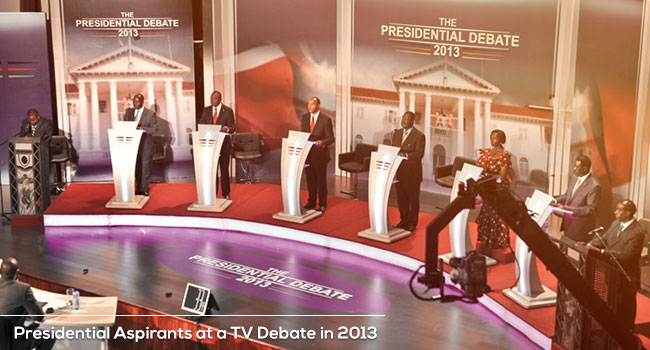The Walk to the Ballot (Bonus): the Aspirant’s pre-election walk

We are here, the year everyone’s been talking about, the year where making history is inevitable; Kenyans are expected to go the polls on the 8th day of August. Do you aspire to become an elected leader? Well, today I am going to talk about an aspirant’s privileged walk to the ballot that takes place way before the elections.
The Constitution assures every citizen the right to free, fair and regular elections based on universal suffrage and the free expression of the will of the electors for—(a) any elective public body or office established under this Constitution; or (b) any office of any political party of which the citizen is a member.
This particular walk to the ballot involves an arguable race of blowing one’s trumpet and aligning with ‘like-minded’ (or somewhat interest based) affiliations. The Constitution of Kenya 2010 brought with it an alternative for political affiliations in the name of independent candidates. To enjoy the political right of vying for an elective post, one must be nominated by a registered political party or apply for nomination as an independent candidate.
Generally, all aspirants and political parties that intend to nominate a candidate for an elective post will observe the provisions of the Constitution, the Elections Act and all other written law in respect of the qualifications and disqualifications for that office. This is governed by Part III of the Elections Act (2011).
“A political party shall nominate its candidates for an election under this Act at least forty-five days before a general election under this Act in accordance with its constitution and nomination rules. (2) A political party shall not change the candidate nominated after the nomination of that person has been received by the Commission: Provided that in the event of the death, resignation or incapacity of the nominated candidate or of the violation of the electoral code of conduct by the nominated candidate, the political party may after notifying the candidate that the party seeks to substitute, where applicable, substitute its candidate before the date of presentation of nomination papers to the Commission. (3) Notwithstanding subsection (1), in the case of any other election, the Commission shall by notice in the prescribed form, specify the day or days upon which political parties shall nominate candidates to contest in a presidential, parliamentary or county election in accordance with its constitution or rules, which shall be at least forty-five days before such election. “
The first step for all aspirants is identifying the specific post one wishes to vie for. There are six elective posts namely the President, Senator for each county (47), Member of National Assembly for each constituency (290), woman elected by voters to the National assembly in each county (47), Governor for each county (47) and Member of County assembly for each ward (1450). Selecting the post of choice will pave way for the qualifications stage as set out in the constitution and its enabling statutes. Basically, there are three major qualifications one must possess to be eligible to vie for a political seat, namely;
- The Citizenship qualification: Under this criterion, an aspirant is expected to have been a Kenyan Citizen for at least 10years before the election for all seats except the President and Governor (including their deputies) which require that a candidate be a Kenyan citizen by birth. The candidates should also not hold dual citizenship and must not owe allegiance to a foreign state.
- The Political qualification: As earlier pointed out, the candidate must be nominated by a political party or be an independent candidate. The main identifying factor of an independent candidate is that he must not have been a member of any political party for at least three months before the election. All candidates must be registered voters.
- The education qualification: This has been a source of controversy for quite some time now. As it stands, only the candidates for President and Governor require a degree to contest for elections whereas all other aspirants just require a post-secondary school education. The situation has been brought about by recent election laws amendment which has seen a standoff between legislators on the minimum education requirements.
In line with the election laws, the Independent Electoral Boundaries and Commission (IEBC) have published the dates and deadlines for requirements ahead of the upcoming general elections. They include;
- A Party Candidate or an Independent Candidate or their authorized agent must submit the following documents to the Commission during the Commission Nomination:
- A certified copy of a national identity card/valid passport (the document used by the candidate to register as a voter)
- A passport size photograph
- If the candidate was a public officer, a letter of discharge from the employer confirming that he or she was not in employment as at February 7, 2017. This requirement does not apply to the Prime Minister, Deputy Prime Minister and Member of Parliament
- If a Party Candidate, a Nomination Certificate from a fully registered political party nominating the candidate, duly signed by an authorized official of the party
- A duly signed Code of Conduct (Second Schedule of the Elections Act, 2011)
- A duly filled Commission Nomination Form 16, including:
- An original Statutory Declaration Form [Regulation 41 of the Elections (General) Regulations, 2012]
- An original Self-Declaration Form [Regulation 46 of the Elections (General) Regulations, 2012] as prescribed in the First Schedule of the Leadership and Integrity Act, 2012
- The names of a proposer and a seconder who shall be registered voters in the respective electoral area:
- In the case of a Party Candidate, the proposer and seconder must be members of the candidate’s party [Regulation 38(b) of the Elections (General) Regulations, 2012]
- In the case of an Independent Candidate, the proposer and seconder must not be members of any political party [Regulation 39(c) of the Elections (General) Regulations, 2012]
- Nomination fees in a Banker’s Cheque payable to IEBC: Kshs. 2,500 (KES 10,000/MP, 25,000/Senator & Governor, 100,000/President) for a candidate who is a woman, a person with a disability or youth. Youth means an adult below the age of 35 years Kshs. 5, 000 (20,000/MP, 50,000/Senator & Governor, 100,000/President) for any other candidate
- Certified copy of a degree certificate in accordance with Section 22(2) of the Elections Act, 2011 and Regulation 47 of Elections (General) Regulations, 2012
- Where the body that issued the degree certificate is not based in Kenya, a certified copy of the certificate must be authenticated and/or equated by the Commission for Higher Education.
- For both Party and Independent Candidates, a soft and a hard copy of a list of at least 2000 supporters from a majority of the counties in the prescribed form, submitted to the Commission Headquarters by January 24th 2013 [Regulation 18(1) of the Elections (General) Regulations, 2012]. The supporters of a Party Candidate must be members of the candidate’s party while those of an Independent Candidate must not be members of any political party
Additional requirements for Independent Candidates:
- A Clearance Certificate from the Registrar of Political Parties certifying that the person was not a member of any political party for the last 3 months before the elections; i.e. as at May 8, 2017 [Regulation 15(a) of the Elections (General) Regulations, 2012]
- A soft and a hard copy of a list of at least 500/MCA (1000/MP, 2000/Senator) supporters in the prescribed form, submitted to the County Returning Officer by May 14, 2017
- A duly filled Form of Intention to Contest in the prescribed form [Regulation 15(b) of the Elections (General) Regulations, 2012]
- A symbol that the candidate intends to use during the election, which has been approved by the Commission, in accordance with Section 32 of the Elections Act, 2011
- Establish and maintain a functioning office in the respective electoral area where the candidate is contesting, which must be available for inspection by the Commission. The address, including the physical address of the office must be communicated to the Commission.





